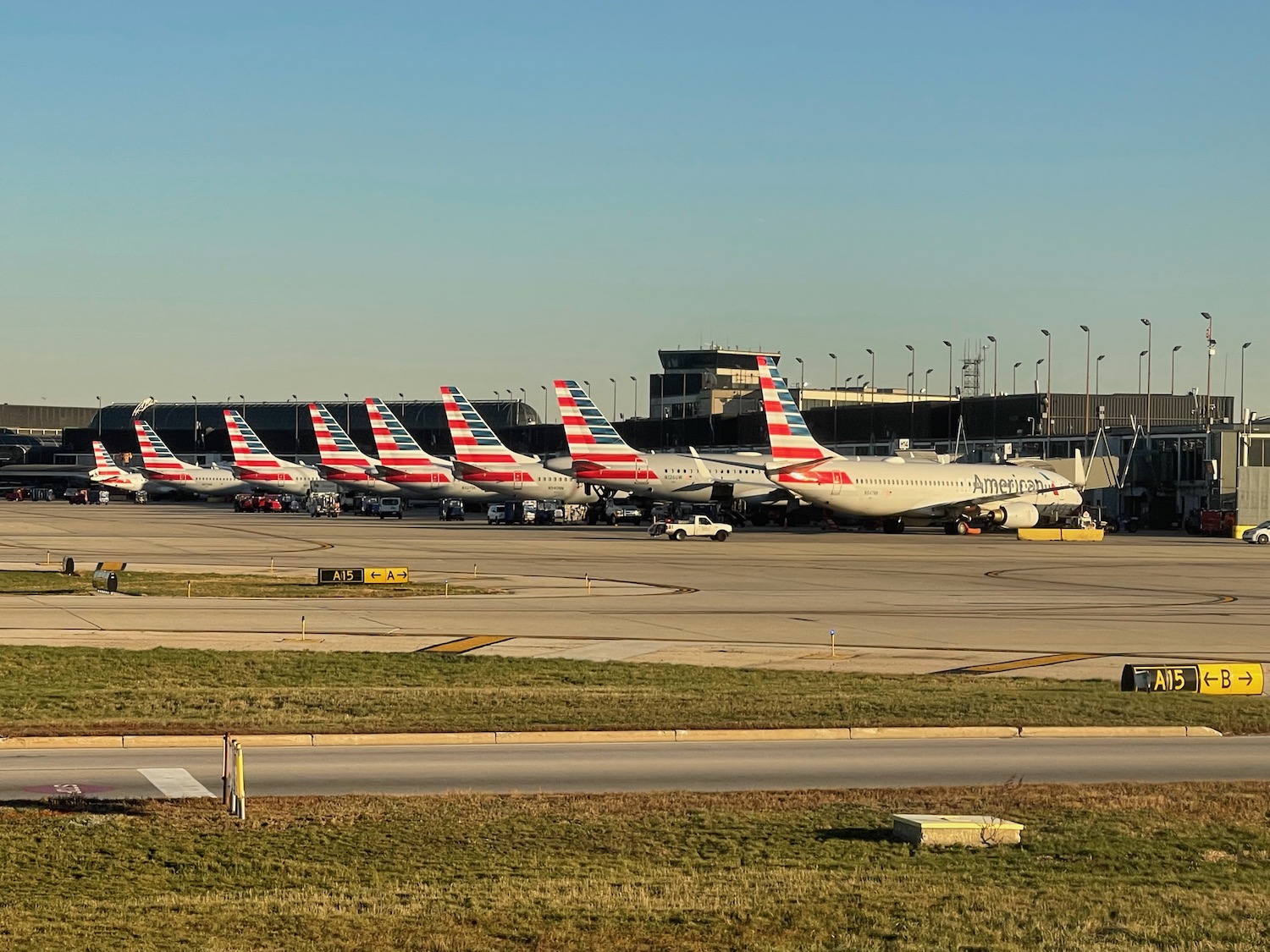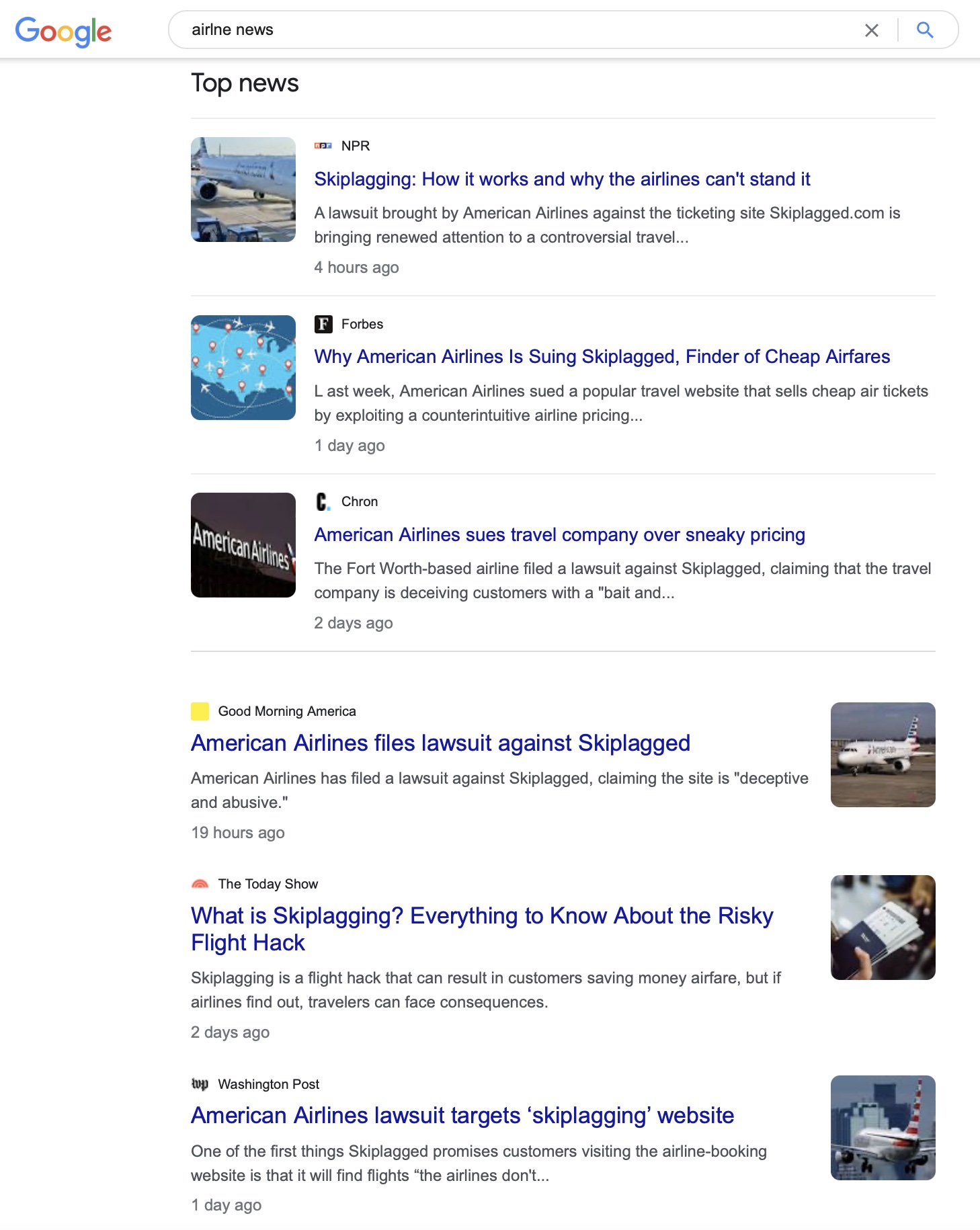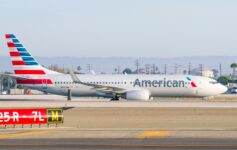
While I do think American Airlines has a decent chance of at least partially prevailing in its lawsuit against Skiplagged, its litigation has brought unprecedented news coverage to the concept of hidden city ticketing. I predict a tsunami of hidden city ticketing from a new generation of customers.
Prediction: American Airlines Lawsuit Will Create Tsunami Of Hidden In City Ticketing
As I outlined last week, American Airlines has a chance at prevailing against Skiplagged for both its ticketing practices and use of the AA logo. Skiplagged and Southwest Airlines ultimately reached a settlement after a similar lawsuit, but you’ll notice that Southwest flights no longer show up on Skiplagged.
Skiplagging is a term that has become synonymous for hidden city ticketing or throw-away ticketing, the idea that A-B-C is cheaper than A-B because carriers charge a premium for nonstop pricing, so you book A-B-C, walk away at B, and pocket the savings. Full example with pictorial illusions here.
American Airlines wants to block Skiplagged from making it easy for customers to engage in this practice, but I do wonder if the opposite will occur: even if American Airlines wins this battle will it lose the war? I ask this because the news of the lawsuit is trending and making waves around the world on mainstream media:

It is not far-fetched to wonder how many of the millions of new people who are now aware of hidden city ticketing as a result of media coverage of this lawsuit will use it themselves. I think many will.
CONCLUSION
For every action, there is an equal and opposite reaction.
American Airlines’ lawsuit against Skiplagged is bringing unprecedented attention to the huge savings that are possible via hidden city ticketing.
These sorts of lawsuits are tantalizing to the mainstream media and it seems to me that even if American prevails in its lawsuit, it will see a raft of new customers start engaging in hidden city ticketing.
And part of me loves that.




While skiplagging may see increased attempts and success in the short term, it’ll also provide airlines with many more data points and make it easier for them to identify & crack down on future cases, ultimately deterring most again. They could start having a specific “risky” list of ppl gate check their bags rather than soliciting volunteers at the gate, for example
I for one think its a fair lawsuit. The ticket agreement is clear, and this is a way of stealing no different than taking form a store.
To characterize this as stealing is inaccurate. Stealing is paying for less than you take. In this case you are paying for more than you take. If someone buys a plane ticket and never show up, would you accuse him or her of stealing? Stealing is illegal, bailing on the second leg of your journey is not.
Skiplagged isn’t a party to the ticketing agreement. And the ticketing agreement isn’t negotiated… Just because a company puts a clause in the contract they present does not make that clause enforceable.
The passenger pays for the ticket. The airline can’t force them to get on a plane of they later decide they don’t want to… That’s essentially kidnapping. People’s freedom of movement trumps airlines wanting to have a certain pricing structure.
It’s also hard for most people to consider lay NG for two flights and only using one as “stealing”.
Not stealing. The full fare was paid, A to B to C. you can’t force someone to take B to C if they don’t want to. They still paid for B to C. It is the fault of the company for pricing A to B to C cheaper than A to B. not my problem some foolish manager did that. Basically banning people for being smart shoppers.
Imagine I book five nights at a hotel, check out after 3 nights because I had to leave and forfeit the remaining nights with no refund. I already paid for the remaining two nights. Imagine the hotel claiming you are stealing the last two nights because you are now not present to eat at their restaurants.
As since some people aren’t too bright, I’m sure more than a few will do this but either forget or don’t understand you can’t check bags.
This is something that has been going on for over 20+ years. I went to a training conference in the 00’s, and the girl next to me had bought two hidden city tickets; one to get to the conference and one to get home. If not, she couldn’t afford to attend the training. Her company travel department made the arrangements!!
In the past, it was just under the radar scope and airlines treated it more of an annoyance as opposed to a threat. Also, loyalty programs were of a greater value back then. Today, loyalty programs are so watered down, they don’t have the cache as before; especially with infrequent fliers. Therefore, just a lot of saber rattling on their part.
As for AA taking the teenager into a closed room. Watch what happens when they do it to an attorney, elderly citizen, or minority. It will come back to haunt them!
What the airlines don’t want is for this to go up through the courts, especially federal. If they lose, they lose BIG!!
Washington bas shown it will do whatever the airlines request. Just like a billion dollar bailout. I expect a travel ban, implemented by each airline individually, for people who do this routinely. Nonstop is a premium price.
The airlines can fix this issue with pricing flights properly. Easy. Even if they don’t want to do so it might pay for them to change the way they price tickets for year or so to make 3rd parties go under and train people to stop looking for hidden city fares.
There is no way that would be worth it to the airlines.
This practice has been around decades and I’m pretty sure no case has ever reached a judgement by a judge or jury… Because the airline would lose. You can’t use a ticketing agreement to penalize people for exercising a fundamental right, in this case freedom of movement: If they don’t want to get on a plane, they don’t have to.
You heard it from the “Father of Hidden City Tickets” himself (GOOGLE IT!). Airlines recruited and funded me to do there dirty work, including the old hidden city trick to dispose of their leftover seats and they’re still doing it today. Why? They benefit! Every 3-5 years, an airline plants a “scare tactic story” as a PR stunt. Most recently it’s AAs fake ban on a teenager trying to deplane in Charlotte. In 2018, it was Lufthansa singing the blues before backing off. Airlines plan propaganda to deter travelers from trying the trick they created and hopefully pay more, though most won’t. Thousands of flyers use hidden city tickets every day worldwide and airlines receive salvage value for an otherwise decaying and overvalued seat.
If I wasn’t so passionate about the topic, I wouldn’t have written two songs dedicated to Hidden City ticketing. The first is “Hidden City Flyer”…Check out the YouTube video at https://youtu.be/Q0hnv9_Ra7o filmed at the iconic TWA terminal in NYC. A second video is in the work for the Hidden Cities, more of a dance track. https://youtu.be/2nDecQo0C5U
I ‘ve also chronicled my experiences with the origins of hidden city tickets being recruited by airlines and private investors as a 19 year old through “Involuntary Reroute”
Finally, when this post below hit Flyertalk in 2000 is was stunning and shocking. Now, 23 years later, it just seems funny that there’s as much uncertainty about the loophole airlines created today as there was then yet airlines are still being paid as they dispose of an otherwise decaying and overvalued asset.
https://www.flyertalk.com/forum/travelbuzz/289424-1stair-net-scam-illegal-tickets.html
If late Supreme Court Justice Antonin Scalia could use hidden city tickets (GOOGLE THAT TOO!) so can you. Do it shamelessly folks…
Two words: Streisand effect.